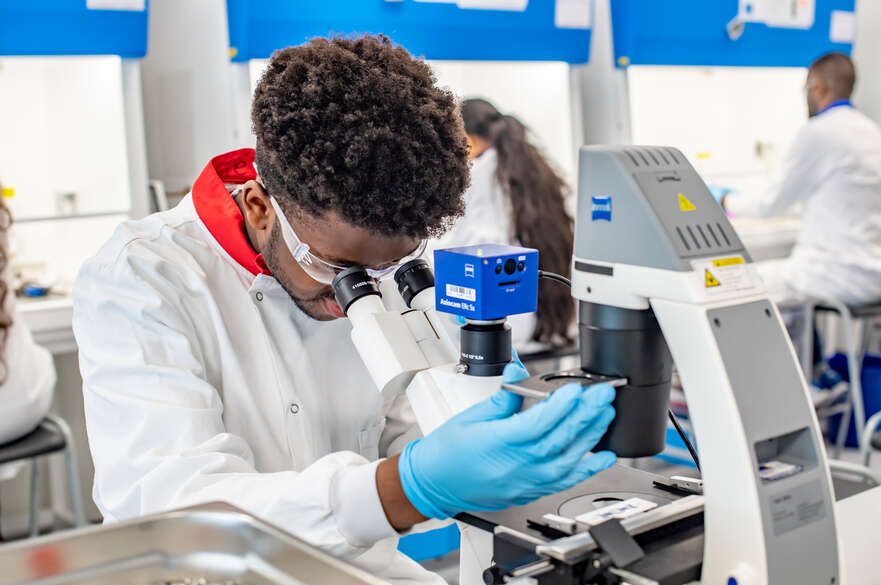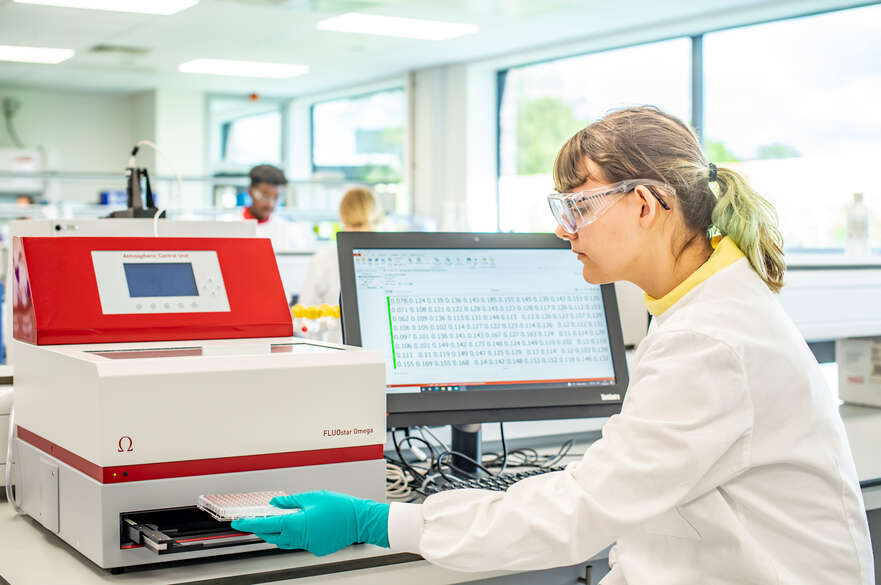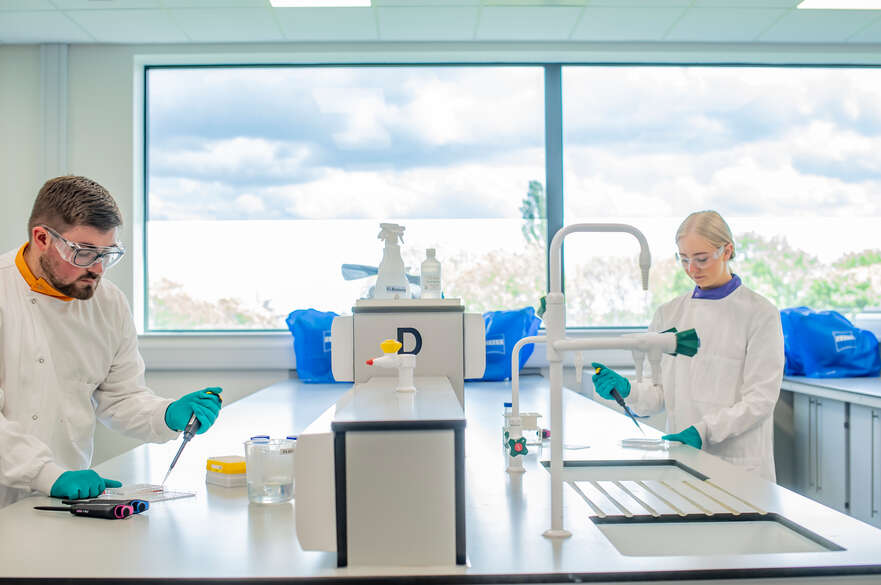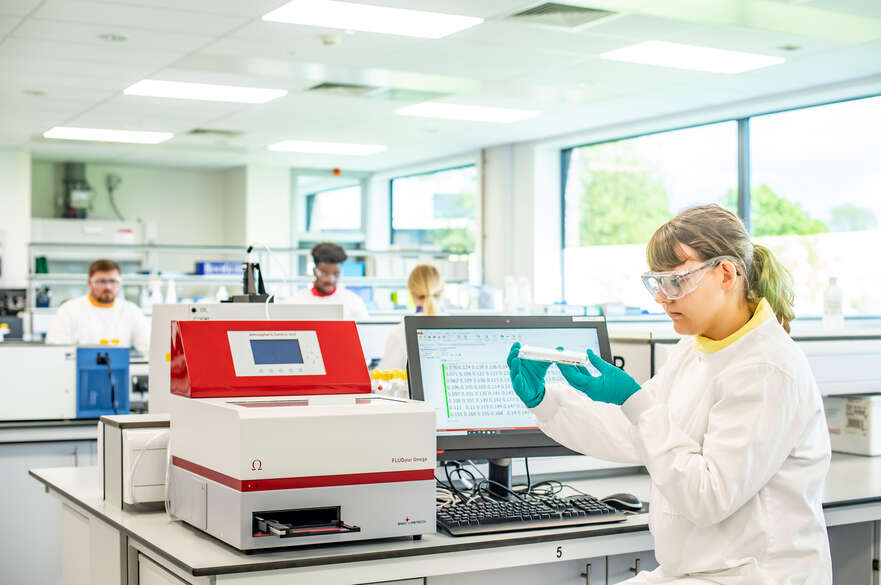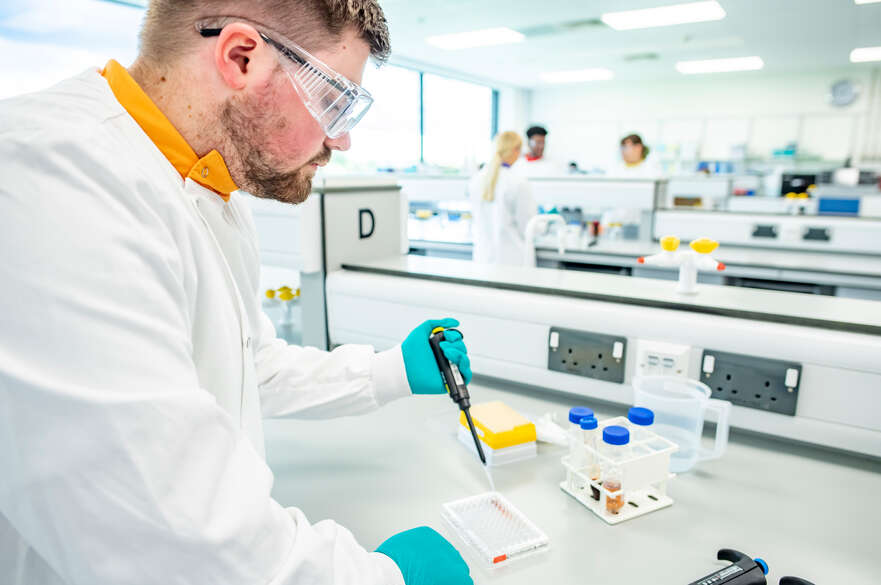Beat the Clearing queue
About this course
This course is an integrated foundation degree, where you'll progress onto our BSc (Hons) Microbiology course, once you successfully complete your foundation year.
Our integrated foundation degrees offer a gateway to our BSc courses for those who currently don't meet the degree-level entry criteria. The foundation year acts as a launch pad, supporting you with the transition to university learning. Anticipate a year filled with the development of robust study skills, increased confidence in tackling intricate problems, and the cultivation of independent learning. Rest assured, by the end of this transformative year, you'll emerge well-prepared for the exhilarating challenges that await you at degree level.
If you change your mind at the end of your foundation year you can transfer onto one of our other BSc Bioscience courses at NTU.
Why study Microbiology at NTU?
Learn about the micro-organisms associated with global health issues such as human immunodeficiency virus (HIV), tuberculosis (TB) and influenza. Focusing on microbes of medical importance, you’ll explore their impacts on food safety, biotechnology and infection diagnostics.
At NTU, it’ll all start with getting to know your way around a lab – picking up all the techniques, tests and applications a future employer could wish for. Then we’ll replicate workplace-like experiences for you, whatever area of microbiology you are interested in whether it is medical research, biotechnology, food safety or infection diagnostics. In each area, you will learn how to analyse and communicate your results.
We’ll also show you how microorganisms influence the world around us, and how microbiology knowledge can help solve big global problems such as climate change, pollution and antibiotic resistance.
Get industry experience
Through group work and the Practical Techniques for Biology and Professional Skills in Microbiology modules, you’ll start designing your own experiments and trying things out. Problem solving skills are valuable for any graduate and we make sure you develop these right from the start of your course, with lots of opportunities to test things out and learn by doing. We’ve also embedded employability skills in the course, so you are not only learning theory and skills, but you know where to find your dream job and how to apply for it.
In your second year you’ll take part in the Microbiology Society’s Unearthed Scheme. Through testing your own soil samples you’ll be trying to isolate antibiotic producing bacteria. Your results will be used as part of the data collect from around the world.
Take a work placement
Placements tell future employers you know how to do it as well as why. Our industry connections as well as the support you'll get from our Employability team all add up to a valuable work placement experience.
In Year Three, you’ll be encouraged to take a year-long placement overseas, or in the UK. Our recent students have taken placements across a wide range of companies including the NHS, Scancell and GlaxoSmithKline. They secured varied roles such as Research Assistant, Trainee Biomedical Scientist (Microbiology) and Assistant Project Worker.
You'll be supported throughout your placement year and will write a reflective report and diary during your placement. When you successfully complete your placement, you will be eligible to receive an additional award of a Diploma in Professional Practice.
Develop your portfolio
While you are at NTU you’ll create a skills portfolio. This is where you’ll keep evidence of all the techniques and skills you’ve mastered. These portfolios help you to document and develop your skills while you are with us. And they are a valuable tool when you graduate too, as they can be used to show future employers you are ready to work in a professional environment.
Research informed teaching
Our research is tackling real-world issues – and the people working on this research will be teaching you. This means you can be sure that what you are learning is at the cutting edge of new biological discoveries. For example, Professor Lesley Hoyles has used her expertise to show how the microbes that live in our guts have wide-ranging impacts on human health and Dr Jody Winter is part of a project which aims to tackle antibiotic resistance in Uganda. https://www.ntu.ac.uk/about-us/news/news-articles/2019/03/university-funded-for-international-project-to-tackle-antibiotic-resistance
During your final year research project you’ll work closely with a member of staff, either on an aspect of their research or in their general area. You may be asked to help develop a new idea that can be incorporated into future research or help with our teaching. You’ll be working on real-world problems and gaining valuable experience at the same time.
Meet our staff
Whether your interest is working in research or in industry we have experienced teaching and technical staff from a wide range of backgrounds including chemical companies, the NHS, clinical diagnostics and medical research. They’ll be teaching you the latest thinking in microbiology and their contacts help us secure guest speakers and support you in finding great placement opportunities.
What you’ll study
During your course you’ll be focusing on microbes and the diseases they cause. You’ll study global health issues such as HIV, TB and influenza and recognise the microorganisms that cause them. You'll then build on this to understand how infections spread and their significance to the global population. You will examine how bacteria and viruses function, how they cause diseases, how the body reacts to infections and how bacteria and viruses can be positively applied in food and healthcare.
Study abroad opportunities
Get ready to embark on an adventure with our study abroad programs at partner universities or by getting a work placement overseas. Both opportunities will boost your employability, build lifelong friendships, and allow you to experience the world in a whole new way.
Applied Biology
Using case studies, you’ll consider the science and ethical considerations in bioscience and medical fields, research and therapeutics as well as topical issues in environmental science. In addition to exploring a variety of topics in health and disease such as infectious diseases inherited and non-inheritable disorders, you will touch on therapeutic approaches.
Data Handling and Analysis
This module will use group work and problem-based learning to give you a strong base of mathematical skills can be applied in biosciences. You’ll learn concepts such as rearranging equations, concentration calculations, metric prefixes, probabilities and exponentials through the lens of real-world biology labs and data analysis of disease scenarios.
Introductory Science for Biologists
This module focuses on the key scientific principles of physics and chemistry that are vital to Bioscientists. In the physics part of the module you’ll be introduced to topics such as wave motion, vibration and methods of heat transfer. The Chemistry part of the module covers some inorganic, organic and physical chemistry, providing biochemical foundation knowledge.
Foundation Biology
You’ll be introduced to core concepts across different areas of biology to ensure you have a broad core biology knowledge. Practical classes in our labs put the theory you’ve learned into context and you’ll also learn good laboratory practice, basic laboratory skills and problem-solving.
Professional Practice and Skills
Bio scientists require an understanding, and in many cases experience, of working in a laboratory environment. This module give you a chance to evidence your practical skills as well as drawing on topics and techniques used in other modules. You’ll work on a group project that will give you experience of working on all elements of a project e.g. research , design, development, testing, evaluation and presentation.
Professional Skills Project
Bioscientists require an understanding and experience of working in a laboratory environment. This module emphasises learning professional lab conduct and brings together knowledge and techniques learned in your other first year modules.
Practical Techniques for Biology
Considers the principles of experimental design, data collection and analysis, including techniques in centrifugation, chromatography, electrophoresis, microscopy and radiobiology.
Genetics and Immunology
Develops genetic concepts and introduces basic aspects of the immune system, including the molecules, cells and interactions involved.
Introduction to Microbiology
Introduces you to the key concepts of microbiology and the defining characteristics of bacteria and viruses, as well as safe working practices with microbes.
Living Systems
Introduces levels of biological organisation from molecules to cells and ecosystems, providing a platform of knowledge and skills upon which other modules are developed.
Introduction to Biochemistry
Study the key aspects of macromolecules, cell structure and function, and interrelationships in both practical and theoretical contexts.
Human Physiology
Introduces the physiology of human organ systems (respiratory, nervous, cardiovascular, urinary, endocrine and muscular) and examines the process of homeostasis.
Applied Microbiology
Reviews the use of micro-organisms in the production of industrially important products and biofuels, and considers lactic acid bacteria and the production of fermented products.
Clinical and Public Health Microbiology
Learn the importance of microbial infections, how they might be diagnosed, the sources of these infections and how sterilisation and disinfection procedures can be used to control them.
Microbial Metabolism and Genetics
Investigate the energy-yielding mechanisms in aerobic, anaerobic and fermentative systems and their diversity and importance to humans.
Microbial Structure, Identification and Distribution
Explore the function of important subcellular structures of micro-organisms, as well as the taxonomy and identification of the main groups of bacteria, fungi and viruses relating to forensic investigations.
Host-Pathogen Interactions
Explore ways in which pathogenic organisms and their human hosts interact with each other, and learn how we might exploit this knowledge to develop new drugs and vaccines.
Professional Skills in Microbiology
Explores current "hot topics" in microbiology such as emerging infectious diseases, antimicrobial resistance and food security.
Forensic Microbiology
Learn the molecular methods of microbial identification and see its role in accidental and deliberate contamination investigations, quality of data collection, analysis and presentation of evidence.
Molecular Microbiology
Study advanced concepts in bacterial genetics, including regulation of bacterial gene expression, molecular biology of bacterial pathogenesis and the application of knowledge in industry.
Immunology and Virology
Study advanced concepts in immunology, including immune responses to infection, cancer and autoimmunity. You’ll also look at concepts in the molecular biology of viral infections.
Infectious Diseases and their Control
Learn about the global importance of infectious diseases, their effect on individuals and the population as a whole and how they can be controlled.
Research Project (40 credit points)
You have the option of either completing a 40 credit point project / dissertation.
Your daily work pattern will be more variable in this year, since time will be set aside for you to carry out your project, and is likely to average about 16 hours per week, of which well over half is practical work.
We regularly review and update our course content based on student and employer feedback, ensuring that all of our courses remain current and relevant. This may result in changes to module content or module availability in future years.
Don’t just take our word for it, hear from our students themselves
Video Gallery
How you're taught
You will typically study six modules in Year One and Two. Each module involves substantial amounts of practical work, in addition to your lectures. In your final year you’ll study five modules and a substantial research project.
Hands-on learning
You’ll learn through a mix of:
- lectures - covering the key theories
- seminars - smaller-group sessions perfect for learning key skills and collaborative working
- practical sessions - using our extensive range of industry-standard facilities
- workshops - this includes surgery sessions where you’ll meet with your lecturer in small groups to discuss any problems or work through challenging topics.
The rest of your time will be spent carrying out independent study such as reading textbooks and lecture notes, and working on exercises.
The course is very practical and you’ll be spending lots of time in our industry-standard laboratories. This is because we believe the amount of time you spend getting hands-on experience in a laboratory is very important to prepare you for the world of work.
You’ll get to work in our state-of-the-art laboratories, right from the very start of your course. You’ll get to know how a professional lab works, how to work safely with bacteria at containment level 2 and how to follow laboratory processes and protocols used in industry – all valuable skills to have before you graduate.
We have a focus on using digital skills to support you in your practical sessions. For example, you might do an online simulation of the experiment you are going to perform in the lab. This will get you familiar with the techniques and protocols so you can be confident and really make the most of your time in our labs. We give you access to a wide range of other e-learning resources too including ebooks, videos and instructional resources we’ve filmed in our own labs. These can help you develop your lab skills even further outside of the lab environment.
Community and support
With support from your lecturers, personal tutors and technical staff, you can be sure we'll be here for you during your studies. Alongside your lectures and lab classes you’ll also have tutorial sessions. These are a chance to regularly meet in small groups with your personal tutor and members of your course to discuss the topics you are studying.
Got any feedback on your course? You’ll have lots opportunities to discuss your course, for example in your tutorial sessions, with your course leader and course reps and you even have the chance to feedback on every module you study with an end of module survey. We love to hear your feedback and how we can make improvements. Following your feedback, we have recently added Professional Skills modules which are specific to the area Biosciences course you are studying. We’ve also increased our support for your coursework assignments too, through drop-in sessions accessible when you need them most.
There’s support from your peers too. Our mentoring schemes gives you support from other students on your course. Whether you need help with your studies or university life in general, they’ve been there and can give you a students’ perspective. Find out more about the support you’ll receive at NTU.
Research informed teaching
Our research is tackling real-world issues – and the people working on this research will be teaching you. It also informs the subjects you’ll be studying with us so you can be sure your knowledge will be cutting-edge in your field. In the last Research Excellence Framework (REF 2021) - the UK's system for assessing the quality and impact of research in universities - we’re proud that 99% of NTU’s Allied Health Professions, Dentistry, Nursing and Pharmacy submission was assessed to be world-leading or internationally excellent.
Learn a new language
Alongside your study you also have the opportunity to learn a new language. The University Language Programme (ULP) is available to all students and gives you the option of learning a totally new language or improving the skills you already have. Find out more about the ULP.
How you're assessed
People excel in different ways, and we want everybody to have the best possible chance of success. That’s why we’ve adopted a range of assessment types, including:
- coursework, including group projects, case studies, dissertation and other assignments
- practical assessments, such as individual and group presentations, laboratory assessments and reports
- exams and tests, including formal exams, written tests and multiple-choice.
Careers and employability
Excellent placement opportunities
A placement is one of the best ways to prepare for your future career. Whether you choose a year-long placement or a shorter summer option, you’ll gain hands-on experience, apply your knowledge in a real-world setting, and develop the skills employers are looking for.
You can take a year-long sandwich placement with support from our expert Employability team. You’ll be guided throughout the process and complete a reflective report and diary. Successfully completing your placement earns you a Diploma in Professional Practice—a great addition to your CV. Students who take placements are twice as likely to secure a graduate job within six months.
Our microbiology students have completed placements with leading organisations including the NHS, Scancell, Public Health England, Arzada and Pfizer, in roles such as:
- Trainee Biomedical Scientist (Microbiology)
- Research Assistant
- Hygiene Microbiology Placement
- Assistant Project Worker
Short summer placements are also available—a flexible way to explore different career paths, gain experience, and build your professional network. Recently students on this course have taken summer placements at NTU in our Department of Biosciences, working on research projects.
Find out more about work placements.
Your career development
With a degree in Microbiology you will be equipped to be competitive for any bioscience related job role. Our strong emphasis on research led teaching will also put you in good stead for a continued progression into postgraduate study and doctoral training.
You have the option to go on to:
- postgraduate study, or employment research and development
- management and technical sales in the bioscience sector
- technical positions in the food and beverage industry and environmental sector.
Our recent graduates have secured roles at companies including:
- Microbiotica
- NHS
- Wellcome Trust Sanger Institute
- Diageo alcoholic beverages
- Northern Foods
They have gone into a wide variety of job roles including:
- Food Microbiologist
- Genome Sequencing Assistant
- Development Technician
- Microbiological laboratory technician
Many graduates also choose to undertake further study on one of our Masters-level courses or MPhil and PhD research degrees.
NTU Enterprise
You'll also have the opportunity to turn your ideas into a viable business with help from NTU Enterprise, NTU's purpose-built Centre for Entrepreneurship and Enterprise, a support centre to help students create, develop and grow their own businesses.
Campus and facilities
You’ll mainly be studying in the Interdisciplinary Science and Technology Centre (ISTeC) and Rosalind Franklin Buildings with access to facilities including our extensive SuperLab, with space for almost 200 students.
Our self-contained, community-focused Clifton Campus has been designed to keep students busy between lectures. Catch-up with your coursemates in the Pavilion’s barista café and Refectory; brainstorm group presentations in chic and stylish study spaces; enjoy some proper R&R in The Point, home of our Students’ Union. The campus also hosts the multimillion-pound Clifton Sports Hub, offering great options for everyone — whatever your interests, and however competitive you’d like to get!
You’re also right next to the bright lights of Nottingham — one of Britain’s top 10 student cities, and one of Europe’s top 25. All through termtime, a dedicated on-campus bus service will get you to the heart of the action (and back) in under 25 minutes. You’ll find a city stuffed with history, culture, and well-kept secrets to discover at your leisure: enjoy lush green spaces, galleries, hidden cinemas and vintage shopping by day, and an acclaimed food, drink and social scene by night.
Entry requirements
UK students
- Standard offer: 72 UCAS Tariff points from three A-levels or equivalent
- Other requirements: GCSE English and Maths grade C / 4
To find out what qualifications have tariff points, please use our tariff calculator.
Additional requirements for UK students
There are no additional requirements for this course.
Contextual offers
If you don’t quite meet our entry requirements, we might be able to make you a lower offer based on a range of factors, including your background (such as where you live and the school or college you attended), your experiences and your individual circumstances (you may have been in care, for example). This is called a contextual offer, and we get data from UCAS to help make these decisions. We do this because we believe everyone with the potential to succeed at NTU should have the opportunity to do so, no matter what barriers you may face.
Meeting our entry requirements
Hundreds of qualifications in the UK have UCAS Tariff points attached to specific grades, including A-levels, BTECs, T Levels and many more. You can use your grades and points from up to three different qualifications to meet our criteria. Enter your predicted or achieved grades into our Tariff calculator to find out how many points your qualifications are worth.
Other qualifications and experience
NTU welcomes applications from students with non-standard qualifications and learning backgrounds, either for year one entry or for advanced standing beyond the start of a course into year 2 or beyond.
We consider study and/or credit achieved from a similar course at another institution (otherwise known as credit transfer), vocational and professional qualifications, and broader work or life experience.
Our Recognition of Prior Learning and Credit Transfer Policy outlines the process and options available for this route. If you wish to apply via Recognition of Prior Learning, please contact the central Admissions and Enquiries Team who will be able to support you through the process.
Getting in touch
If you need more help or information, get in touch through our enquiry form.
International students
- Academic entry requirements: 72 UCAS Tariff points from three A-levels or equivalent. We accept equivalent qualifications from all over the world. Please check your international entry requirements by country.
- English language requirements: See our English language requirements page for requirements for your subject and information on alternative tests and Pre-sessional English.
Additional requirements for international students
There are no additional requirements for this course.
English language requirements
View our English language requirements for all courses, including alternative English language tests and country qualifications accepted by the University.
If you need help achieving the language requirements, we offer a Pre-Sessional English for Academic Purposes course on our City campus which is an intensive preparation course for academic study at NTU.
Other qualifications and experience
If you have the right level of qualifications, you may be able to start your Bachelors degree at NTU in year 2 or year 3. This is called ‘advanced standing’ entry and is decided on a case-by case basis after our assessment of your qualifications and experience.
You can view our Recognition of Prior Learning and Credit Transfer Policy which outlines the process and options available, such as recognising experiential learning and credit transfer.
Sign up for emails
Sign up to receive regular emails from the International Office. You'll hear about our news, scholarships and any upcoming events in your country with our expert regional teams.
Getting in touch
If you need advice about studying at NTU as an international student or how to apply, our international webpages are a great place to start. If you have any questions about your study options, your international qualifications, experience, grades or other results, please get in touch through our enquiry form. Our international teams are highly experienced in answering queries from students all over the world.
Policies
We strive to make our admissions procedures as fair and clear as possible. To find out more about how we make offers, visit our admissions policies page.



